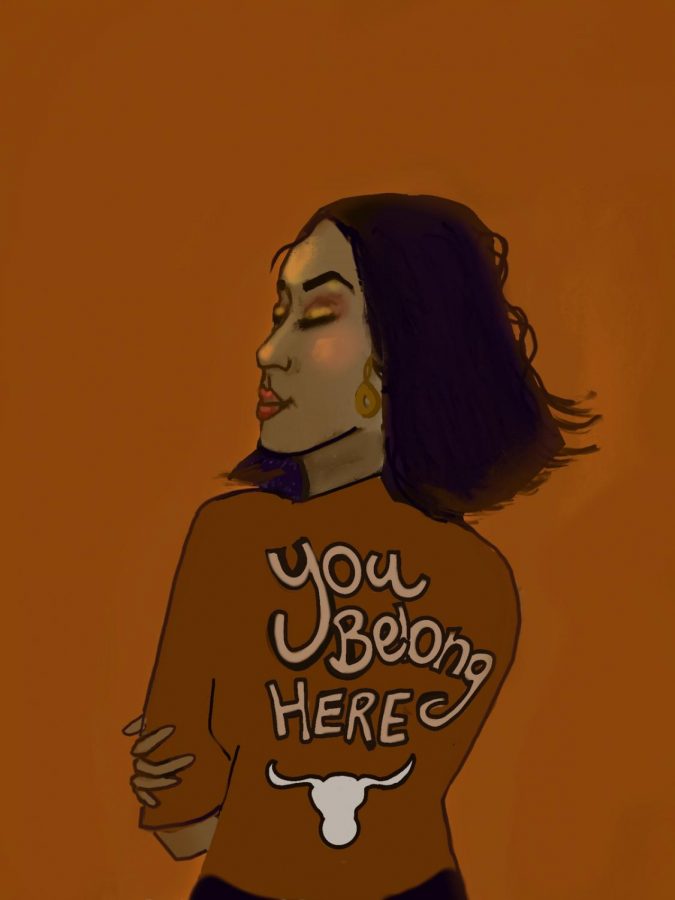Black, Hispanic women share feelings of “impostorism,” self-doubt
December 17, 2021
Editor’s Note: This article first appeared in the October 19 flipbook.
Attending Calculus I office hours for the first time her freshman year, Rebecca Cedillo remembers her professor saying civil engineering “wouldn’t work out for her.” Cedillo left the encounter feeling disheartened and questioning her worth.
“It took me so much time to accept that I do belong here, that they didn’t make a mistake when they admitted me into UT,” Cedillo said.
UT’s new class welcomed 27.1% Hispanic students, a record high and 5.4% Black students, a slight decrease from last year. Many students, especially women of color, still feel out of place among their peers, leading to feelings of self-doubt.
Kevin Cokley, department chair of educational psychology, researches the imposter phenomenon. He said compared to their white peers, students of color experience the phenomenon more deeply due to outside messages about their groups.
“Individuals will work incredibly hard (and) try to be perfect,” Cokley said. “No one is perfect, and the failure to be perfect can contribute to even more feelings of (being an) imposter.”
As one of the few Black women in her graduate program, Shaina Hall, a counseling psychology doctoral student, said UT should invest more in students of color by providing more community spaces or through fellowships and research opportunities.
“Being a student of color in spaces where I’m not supported perpetuates those feelings of not being good enough,” Hall said. “We will always have imposter phenomenon if the systems that we’re in continue to validate that students are inferior.”
Amid a white male majority in her engineering classes, Cedillo said she prepared extra to gain respect from her classmates. Cedillo said her peers overlooked her input, which made her feel as though she needed to prove her capability to herself and to them.
“(Faced) with microaggressions and misogyny every week in class, I felt so out of place,” Cedillo said. “(I would ask), ‘What is wrong with me? Why do I feel so dumb?’”
When she struggled with understanding class material, Cedillo said asking for help made her feel inferior to her peers. She said she felt like she needed to know all the answers all the time, and she felt unworthy of her scholarship when she didn’t know something.
“One of my biggest fears my freshman year was being seen as a failed investment because I got a full ride,” Cedillo said. “I felt like I wasn’t doing anything with it because I was just so emotionally drained.”
Transitioning from a majority Hispanic high school in Austin to UT, journalism sophomore Michelle Tamayo said she felt as though she had to catch up to her peers’ accomplishments, especially as a first generation college student with immigrant parents.
“All my life, my dad has told me, ‘We’re doing this for you,’” Tamayo said. “‘We’re working (and) this money is for your education.’ … So I don’t want to feel like all the hard work they’ve put in since they’ve gotten here was for nothing.”
Struggling to find students with similar backgrounds as her own, government sophomore Aria-Kailyn Tolbert said she joined Texas’ Black Student Alliance to ease her overwhelming feelings of self-doubt.
“I can talk to other Black students about not just feeling like an imposter academically, but feeling like an imposter on this campus because there’s so few of us,” Tolbert said. “It’s great to know I’m not the only one who’s struggling with these (feelings).”
To combat this feeling, Cokley said he recommends students who suffer from self-doubt and imposter feelings should write down any accomplishments they have, no matter how small, to look back to when doubting their abilities. He suggested talking to students who may share the same experiences.
“People will suffer in silence with insecurities,” Cokley said. “But when you talk about it with other people who have a shared experience, you’ll find that you aren’t the only one feeling that way. You might be surprised to find out how many people feel the way that you do.”



